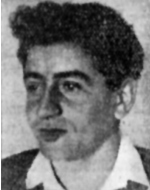Kellerman, Moshe (Klaus)
Son of Rosa and Abraham, was born on December 31, 1912, in Czestochowa, Poland. As a student at the Gymnasium he joined the Hashomer Hatzair branch and was known for his simple manner, his energy and diligence, his cleverness and his devotion to the idea. He soon became prominent as a guide in the local nest, in the summer colonies, then as a guide to the Zaglebie region, and finally joined the main leadership of his movement in Rovno and later in the center in Warsaw. On April 4, 1939, he immigrated to Israel and joined the first camp of his kibbutz in Netanya. With the will he overcame the pains of rheumatism and adapted himself to hard physical work. In the evenings and Saturdays, he devoted himself to cultural work in his kibbutz and to the general public in Netanya. In 1942 he joined the British Army and served in the Artillery Corps in the Western Desert and Italy. He also devoted himself to public activity and was elected as a representative in the mutual aid organizations. When he returned home to his kibbutz, which had meanwhile settled in Yad Mordechai in the Gaza Strip, he was assigned the position of secretary of the kibbutz, who filled it with devotion. Afterward, as a member of the Diaspora Center, he was instructed to instruct the “Herut” group of immigrants from the Bergen-Belsen camp to become involved in the work and life of the kibbutz in Israel. In addition to these public functions, he worked in the poultry industry. As a veteran army man, he did not believe in the steadfastness of Yad Mordechai against the Egyptian army, which had plenty of weapons, but did its part to defend the point. As a trained gunman, he served alongside the single mortar, moved from position to position and hit the enemy concentrations, and when the shells failed, he continued to fight the Kravai on the first line. In his letter on the last day to his wife, who was evicted from the farm with their two children and with the other mothers and children, he expressed the hope that “some of our members may still be able to see the victory and lend their hand to rebuilding the ruins.” “We hope that we will see each other, but if you do not, you will know how to carry this,” and informed his son that “there are tens of thousands of shells of shells.” On the 14th of Iyar 5708 (May 23, 1948), the enemy’s armor broke into the spot and he fell on guard. He was brought to eternal rest in the cemetery at Yad Mordechai.
